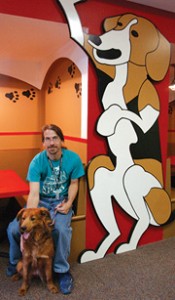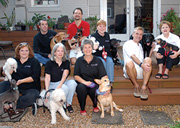Who Lets the Dogs Out?
When you can’t care for Fido or Fluffy, these people will.
Photo captions:
The board members of The Pet Patrol pose with their animal companions
(in front, l–r): Grace Horton-Olmos with Dolly and Nikki, both rescue dogs; Nicki Thorne-Thomsen with Magic, her special-needs fox terrier; Pet Patrol founder Tori Williams with Sophie;
(second row, l–r) Ryan Johnson with Indie; Chris Arnot with Phoebe; Lynne Shepherd with stuffed felines representing her own cats, Bandit and Keys (who were not comfortable, Shepherd reports, with a yard full of dogs); Mark Siurek with Sister and Lola; and Linné Girouard with Apache.
Keith Curry works with the adoptable pets at the Houston SPCA.
__________________________
“I’m on HIV treatments and chemo therapy,” says Richard, sounding tired. “My dogs are my family. I don’t have any other family. I never forget to care for them, but sometimes at 5 o’clock I would go to feed them and realize I forgot to buy food. Now The Pet Patrol calls me every week. They ask me to check and see what I need, and they’ll bring it to me. It’s almost surreal the way they treat me. I can’t say enough about them. They’ve allowed me to keep my babies with me, and that’s what keeps me going.”
The Pet Patrol, created in 1986, is one of the oldest, possibly even the first, such organization in the country.
“It was 1986,” remembers founder and president Tori Williams, “and like so many in the GLBT community, I was doing volunteer AIDS work. I would go on these intake calls and ask the clients what their top three concerns were and if they had a pet, and so many did. They would always say they were worried about who would take care of their animals.”
Williams found herself passing out cards and asking clients to call her if they were hospitalized or became too ill to care for their beloved pets. Pretty soon she recruited friends to help, and The Pet Patrol was born.
“Back in the early days of the epidemic, people wouldn’t take in a pet for fear that they could get AIDS from it,” she says. “And people got sick so fast back then. At one time we had 400 human clients and 800 pet clients.”
 As knowledge and HIV/AIDS treatment advanced, the immediate need for The Pet Patrol in the community declined. The nonprofit organization lay dormant for a while but was revived last year and expanded to include clients with other terminal illnesses and the elderly. Volunteers provide in-home and foster pet care and deliver food and supplies. The organization can often provide free veterinarian and grooming services for qualified clients and finds adoptive homes for pets whose owners have passed on. Williams herself has a nine-year-old rat terrier, Honey Bunch, who is a Pet Patrol rescue dog.
As knowledge and HIV/AIDS treatment advanced, the immediate need for The Pet Patrol in the community declined. The nonprofit organization lay dormant for a while but was revived last year and expanded to include clients with other terminal illnesses and the elderly. Volunteers provide in-home and foster pet care and deliver food and supplies. The organization can often provide free veterinarian and grooming services for qualified clients and finds adoptive homes for pets whose owners have passed on. Williams herself has a nine-year-old rat terrier, Honey Bunch, who is a Pet Patrol rescue dog.
“To deal with HIV/AIDS, the community created these wonderful volunteer models,” Williams says. “And now we can share those with other communities. I am very proud of that.”
A similar volunteer-driven nonprofit also provides help for our four-legged friends with humans in need.
“We can provide for our in-home clients’ annual wellness visits, food, exercise for their pet, heartworm and flea medications, and foster care for the clients’ pets when necessary,” says Donna Dishman, executive director of Pets Are Wonderful Support (PAWS). This organization was founded in 2002, during Pet Patrol’s dormant years, with the mission to help sustain client-pet relations through a period of the owner’s terminal or chronic illness. But PAWS provides another function as well: the Personal Pet Visitation Program.
“We can bring their pets to them in the hospital seven days a week, 24 hours a day,” Dishman says. “Patient care goes beyond physical medicine. Our pets provide something that modern medicine may never understand. We’ve had stroke victims that have spoken their first words when their pets were brought to them in the hospital.” Hospital visits average 20 to 30 per month, and PAWS is working on obtaining research grants to document the vital health link between people and pets.
“It’s a very rewarding process,” says Dishman, who herself owns three rescued Malamutes, one of which, Katie, makes hospital and hospice visits. “Our pets are just so important to us.”
______________________
Animal Attraction
Both The Pet Patrol and PAWS Houston seek donations of food, supplies, and pet services as well as volunteers and cash contributions.
• www.thepetpatrol.org
• www.pawshouston.org
PAWS Houston holds a volunteer orientation session on November 7, 5:30–7 p.m., at its office (Two Riverway).
______________________
Finding Home
If you have decided to bring a pet into the family, check out some of the agencies that shelter rescued pets that are waiting for adoption:
• Bureau of Animal Regulation and Care (BARC)
City of Houston
713/229-7300
www.houstontx.gov/health/BARC
• Citizens for Animal Protection
281/497-0591
www.cap4pets.org
• Friends for Life
www.nokill1.org
• Homeless Pet Placement League
713/862-7387
www.hppl.org
• Houston Humane Society
713/433-6421
www.houstonhumane.org
• SPCA
713/869-SPCA (7722)
www.spcahouston.org
• Special Pals
281/529-PETS (7387)
www.specialpalsshelter.org
Marene Gustin profiled Michele Ostrander, executive director of Susan G. Komen Race for the Cure for our October issue (“On the Run”).











